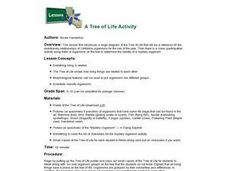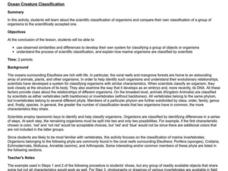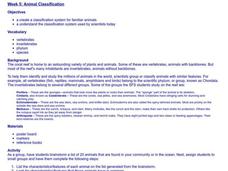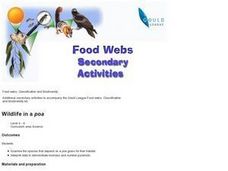Curated OER
Species Diversity and Phylogeny
Students explore the classification system of organisms: taxonomy. They examine prepared slides of Protozoans and record information on a Taxonomy Recording Sheet. Two additional classifying activities are also included in this lesson.
Curated OER
What Kind Of Mammal Is It?
Learners describe the characteristics of a mammal. They also differentiate between a companion and a wild animal. The lesson plan has an assessment included in it. They have a discussion to tap prior knowledge about what a mammal is.
Curated OER
Look Up - Birds
Students investigate the concept of birds. They identify five different types of birds and name the characteristics that make them different than other living things. Students also name the different parts of the bird and how they are...
Curated OER
Farm Products Help Me Grow
Students view a display of empty food containers (or illustrations). They select a food and decide as a class if it has an animal or plant origin. Students view a display of common farm animals that are commonly eaten (cow, pig, chicken,...
Curated OER
Classifying Living Things
Learners identify how to classify living things. They classify various concepts including family members, kinds of clothing, numbers, shapes, and vocabulary words. They discuss how to classify various concepts and classify pictures of...
Curated OER
Classify That!
Students explore diverse forms of life by using modern biological classification systems to group animals that are related. Students then study basic scientific groupings like genus, species, mammals, fish, birds, amphibians, and...
Curated OER
"Zoophyla"
Ninth graders gain an understanding of organims based on charateristics. They study about Kingdom Animalia and use technology to present knowledge of phyla. Finally, they create a new animal species of their own. When others present,...
Curated OER
A Tree of Life Activity
High schoolers solve a mystery of the identification of a unknown organism by comparing its morphological characteristics to those in a tree of life classification poster. They compare the observable characteristics of the specimen and...
Curated OER
An Automobile Phylogenetic Tree
Students construct a phylogenetic tree for various automobiles and trucks after considering important characteristics of these "organisms". They work in small groups to construct the trees and complete a set of questions then they...
Curated OER
Studying Species By Examining the Evolution of the Canidae Family
Pupils read an article on the characteristics of wolves and dogs then complete a phylogenetic tree of the canid family. They then write an essay justifying why or why not wolves and dogs should be classified as different species.
Curated OER
Classification in Action
Students work with a set of objects to set up both quantitative and qualitative classification systems. As a group, students follow an example to design and complete two classification systems using a set of objects provided. ...
Curated OER
She Sells Sea Shells in Illinois??
Second graders sorted shells first by methods they thought appropriate and then were instructed on the scientific method of classification by univalve and bivalve. Students then sorted paper shells as a method of assessing knowledge. It...
Curated OER
Tracy Aviary Wetland Restoration Module - WEST
Students become engaged in wetland conservation as they take part throughout the school year in restoring a small wetland at the Tracy Aviary. They visit the Tracy Aviary wetland at various times during the year and become involved in...
Curated OER
Chick Embryology
Students investigate techniques that can be used to observe the development of the chick embryo. They explore the environment in which the chick develops and how it can be manipulated.
Curated OER
Classification 2
Students discuss what makes a living thing (for example, cellular respiration) and collect a selection of living things from outside. They divide their organisms into plants and animals and create a key for the divisions.
Curated OER
Animals and Habitats of the Chesapeake Bay
Young scholars work in small groups to discover the various habitats present in Chesapeake Bay and the animals that live in them. After investigating the habits and lives of the animals they will draw conclusions about other habitats...
Curated OER
Sorting and Using Materials
Students practice sorting and classifying objects. In groups, they choose a variety of materials and describe how each one looks and feels. They must agree on how to classify each object and share their groupings with the class. They...
Curated OER
Ocean Creature Classification
Students develop a Taxonomic Key for marine invertebrates from pictures they are given after practicing together with common objects, such as shoes. They then compare their key to a provided Ocean Invertebrates Taxonomic Key.
Curated OER
Ocean Creature Classification
Students develop their own system for classifying a group of objects or organisms using observed similarities and differences. They investigate the process of scientific classification, and explain how marine organisms are classified by...
Curated OER
Animal Classification
Students list characteristics and features of animals found in their community. They then group the animals according to how they are similar and different and create names for each group. They then create a chart of their...
Alabama Learning Exchange
Let's Identify and Classify
Learners participate in a creative activity to give them a good understanding of classification. They examine bags of chips and discuss their similarities and differences. Students work in small groups while participating in this activity.
Curated OER
Wildlife in a Poa
Students examine the species that depend on a poa grass for their habitat and interpret data to demonstrate biomass and number pyramids. They examine the plant by digging it up and pulling it apart quickly to capture all the...
Curated OER
Pyramid of Biomass
Students interpret data to demonstrate biomass and number pyramids. They use information to draw conclusions and examine an example of biological magnification.
Curated OER
Food Web Chasey
Students work together to review the concepts of food webs and food chains. They describe the role of plants and animals when dealing with the cycling of energy. They identify any behavioural strategies to help the animals survive.

























